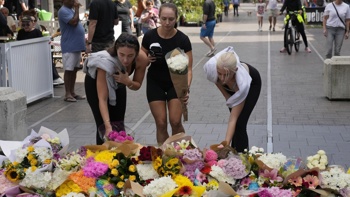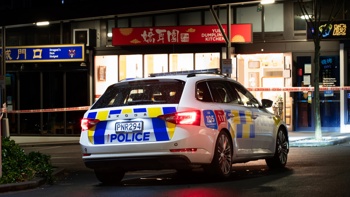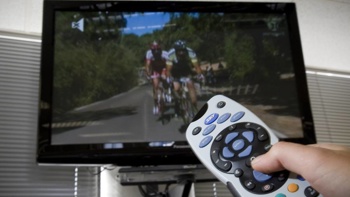But the overarching "character test", which requires every foreign national to maintain "good character" to keep their Australian visa, has left at least one teenager in the lurch.
The 17-year-old boy is the youngest New Zealander to be detained since the special powers came into effect in December 2014.
Born in New Zealand, the teen and his family moved to Australia when he was 11.
/arc-anglerfish-syd-prod-nzme.s3.amazonaws.com/public/CRXLQWDHT5AORIQOAK3PYF5BOI.jpg)
By the age of 17, he had landed himself in a Sydney juvenile detention centre. While his offences have not been disclosed, his lawyer argues they are "stock standard" and not enough to spark deportation.
But just as he was about to be released, the boy was instead taken more than 12 hours away to an immigration holding centre in Melbourne and has been awaiting deportation since March.
His lawyer has called for the boy to be released back to his family in Sydney and said he's worried for the teen's mental health.
In September 2017, while awaiting deportation in a Sydney detention centre, New Zealand-born Junior Togatuki, 23, took his own life.
The teen's case — and Junior's death — has thrown Australia's hard line deportation laws into the international spotlight.
Earlier this week, Acting Prime Minister Winston Peters made a direct appeal to Australia to release the 17-year-old boy, who has now been in the adult detention centre for more than three months.
Peters reminded Australia it was a signatory to the United Nations Convention on the Rights of the Child and called on the country to live up to its obligations.
"This person is regarded as a child or a minor, and I'm just reminding the Australians — you're a signatory, live up to it," Peters told reporters earlier this week.
"They are clearly in breach of it. There's no complication. They know that, we know that.
"We're asking Australians for a fair suck of the sav so to speak, where international protocols are observed."
/arc-anglerfish-syd-prod-nzme.s3.amazonaws.com/public/IP5WISYGAVCJFHGC2AHVLTW3AI.jpg)
Last year, more than 600 Kiwis were deported on grounds of "bad character".
Some of the more high-profile deportations from last year included Caleb Maraku, who was sent home in March, and Daniel Maxwell, who was deported in August 2017.
Maraku drew national outrage earlier this year when he walked from a Gold Coast court laughing after escaping a jail sentence for coward punching a teenager in Brisbane.
Maxwell was deported after Home Affairs Minister Peter Dutton received a call from Cole Miller's dad asking for the 21-year-old to be deported.
Maxwell was responsible for starting a fight with Cole in January 2016 that ended with another New Zealander Armstrong Renata fatally punching him.
/arc-anglerfish-syd-prod-nzme.s3.amazonaws.com/public/NAEHKJI4O5E7DJI7K2X6VADZSE.jpg)
When Renata is finished serving his seven-year sentence for killing the Brisbane teen, he will also be sent back to New Zealand.
Dutton has since responded to the comments from New Zealand, telling the acting PM the 17-year-old is "welcome to get on the first flight out".
"We don't want him here in Australia," Dutton said.
"My primary obligation is to the Australian public, to keep Australians safe.
"We will make sure that he's deported at the first available opportunity, but at the moment he's delaying his return to New Zealand."
FAILING THE CHARACTER TEST
The Home Affairs Department and Dutton have discretionary powers to cancel the visas of people who could pose a risk to the community or that they've deemed are not of "good character".
"Entering or remaining in Australia is a privilege, and it is expected that non-citizens are, and have been, law-abiding. Visa holders must also continue to satisfy the character requirement," a fact sheet for Section 501 of the Migration Act reads.
The Migration Act was amended in December 2014 and since then, deportations have risen sharply.
And even if visitors pass the character test required to enter Australia, the Department of Home Affairs and Dutton "have the power to refuse or cancel a visa on the basis that a person does not pass the character test".
Anyone who is sentenced to more than 12 months in prison will see their visa immediately cancelled.
In the past three years, the department has been responsible for deporting more than 3000 people who it felt didn't satisfy the requirements.
In 2017, 1200 non-citizens had their visas cancelled and faced deportation.
In Queensland, 300 foreign nationals were stripped of their visas last year, second only to NSW which deported 430 people.
More than 600 New Zealanders living in Australia have been kicked out since the Act was amended.
After Maraku was deported, six years after he first came to Australia, Dutton told A Current Affair he would continue his no-nonsense approach to deport anyone who might threaten the "good nature" of Australian society.
"Many of these people that are committing offences don't deserve to become Australian citizens," Dutton told A Current Affair.
"If we can cancel their visas before they become Australian citizens we are going to save on welfare, we are going to be a safer society."
Dutton compared foreign nationals committing crimes in Australia to someone being invited into your home only to be harmed by them.
"It's no different to being invited into somebody's home — you don't start assaulting the residents of that house, you don't start assaulting Australian citizens and if you do you are shown the door," he said.
The Department of Home Affairs has been contacted for comment.
WHERE TO GET HELP:
If you are worried about your or someone else's mental health, the best place to get help is your GP or local mental health provider. However, if you or someone else is in danger or endangering others, call police immediately on 111.
OR IF YOU NEED TO TALK TO SOMEONE ELSE:
• LIFELINE: 0800 543 354 or 09 5222 999 within Auckland (available 24/7)
• SUICIDE CRISIS HELPLINE: 0508 828 865 (0508 TAUTOKO) (available 24/7)
• YOUTHLINE: 0800 376 633 ,free text 234 or email [email protected] or online chat.
• NEED TO TALK? Free call or text 1737 (available 24/7)
• KIDSLINE: 0800 543 754 (available 24/7)
• WHATSUP: 0800 942 8787 (1pm to 11pm)
• DEPRESSION HELPLINE: 0800 111 757
• SAMARITANS – 0800 726 666.









